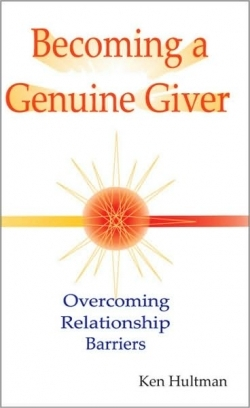Becoming a Genuine Giver
Overcoming Relationship Barriers
Most people find it difficult to follow the biblical advice that it’s better to give than to receive. Even though cultures throughout the world acknowledge giving as a desirable trait, realization of that ideal presents challenges for all. Those who are able to give selflessly of their time, money, and talent testify that they experience rewards far greater than what they’ve given. Yet many still hold back and remain puzzled as to why a meaningful life eludes them.
Ken Hultman believes that anyone who learns to give unconditionally will find greater satisfaction in their relationships with others. His book, Becoming a Genuine Giver, explains how people can learn to awaken their impulses to give and receive without expecting something in return. The book’s personality assessment test, the Interpersonal Motivation Scale (IMS), was designed by the author to increase understanding of an individual’s style of giving and taking. Nine basic types of personal motivations, such as insecurity, guilt, rationality, or detachment, influence behavior. Hultman describes case studies of each of these types. He concludes with suggestions about how readers might change these negative patterns to help them become genuine givers.
With over thirty years of experience as a consultant, trainer, coach, and therapist, Hultman has written six books and numerous articles. He received a doctorate in counseling psychology from Rutgers University and is a licensed clinical counselor.
People can improve their capacity for giving regardless of age, but efforts to change require great courage, and the process continues throughout one’s life. Hultman writes, “People who wage this noble battle are in a unique position—they can change the world.”
Humans thrive on acceptance and understanding from other people. Without validation of self-worth, they feel insecure and unsure of themselves. “The idea that someone else would accept us as we are is one of life’s most powerful concepts,” the author writes. “There is no greater gift than this.” Authentic acceptance helps people awaken to greater possibilities for giving and receiving.
To sincerely care about others and take on their burdens, individuals must let go of self-centered thinking. A spiritual orientation can help them overcome selfish inclinations. “Believing that God or a higher power watches over and protects the people we care about provides comfort in the midst of uncertainty, and offers hope…that good comes out of bad,” Hultman explains.
This thoughtful and well-organized book concludes with explanatory notes, a glossary, and a bibliography. The IMS profile at the book’s beginning and the interaction planning guide pages at the end provide practical tools for both lay readers and professional counselors to use. The text contains minor typographical errors.
Hultman reveals his own struggles to keep an open heart to giving in times of crisis. Individual readers and professional therapists who focus on helping themselves and others to live more charitable and satisfying lives will all find this book worthwhile.
Reviewed by
Margaret Cullison
Disclosure: This article is not an endorsement, but a review. The publisher of this book provided free copies of the book and paid a small fee to have their book reviewed by a professional reviewer. Foreword Reviews and Clarion Reviews make no guarantee that the publisher will receive a positive review. Foreword Magazine, Inc. is disclosing this in accordance with the Federal Trade Commission’s 16 CFR, Part 255.

